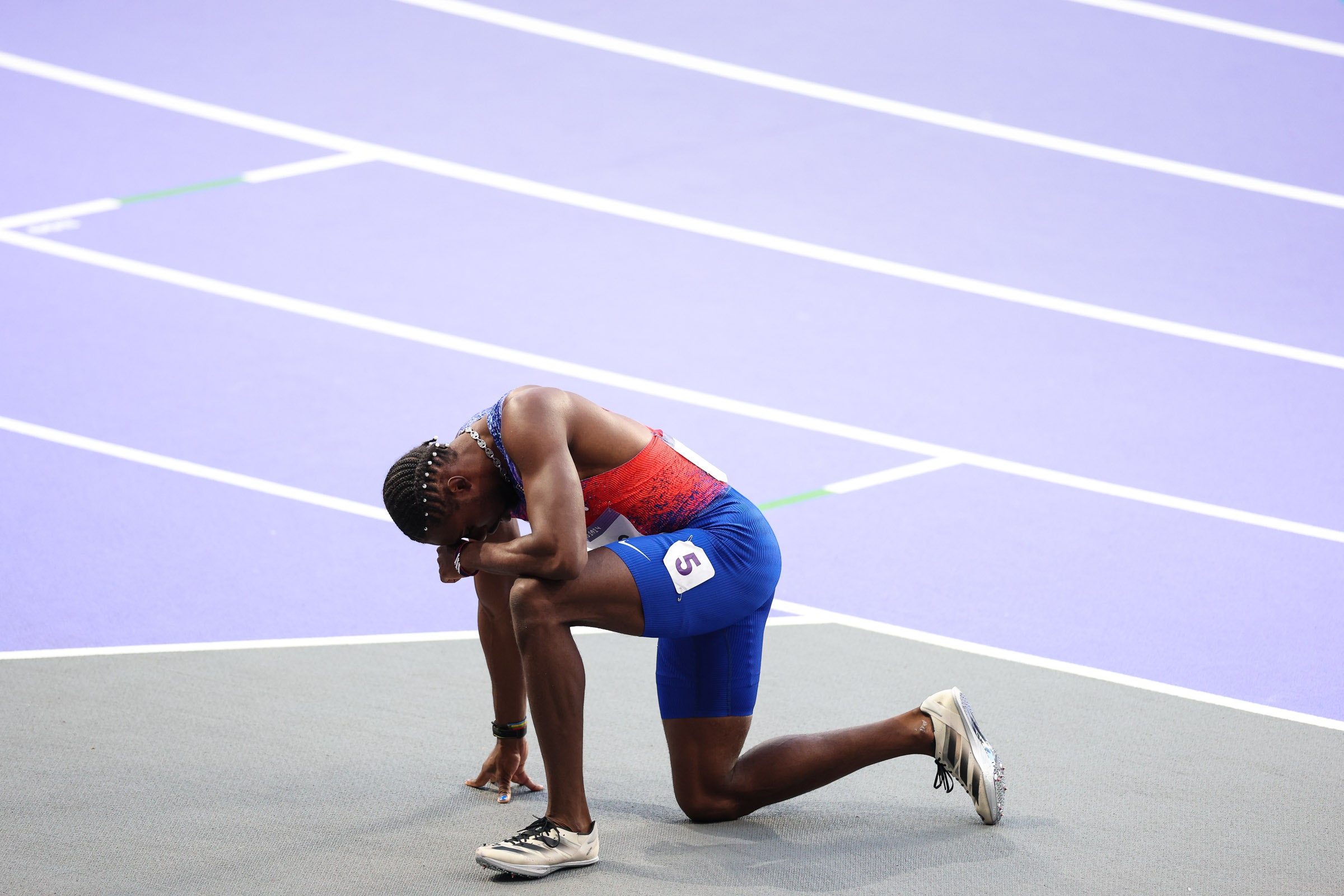
Covid cases have spiked every summer since 2020, and this season is no exception. A Covid wave is once again sweeping through much of the world and has reached the 2024 Paris Olympics.
But the Games have gone on without interruption, despite at least 40 athletes testing positive for the virus, according to the World Health Organization. One of those, US track star Noah Lyles, ran the men’s 200-meter race on August 8 despite getting a positive result on a Covid test just two days before. After earning a bronze medal in the race, he received medical attention and was taken off the track in a wheelchair. Lyles, who also has a history of asthma, said he was short of breath and experienced chest pain after the race and that Covid “definitely” affected his performance.
The laissez-faire approach to Covid at the biggest and most prestigious sporting event in the world is far removed from the tight restrictions seen at the past few Olympics—and it raises questions about how society should manage the virus both at large, public events and in everyday life moving forward.
“Covid-19 is still very much with us,” said Maria Van Kerkhove, an epidemiologist with the WHO, at a news briefing on August 6. Data from the organization’s surveillance system across 84 countries shows that the percent of positive tests for SARS-CoV-2 has been rising for several weeks.
There are no specific Covid-19 rules at the 2024 Paris Olympics, a stark contrast to the two Olympic Games held during the throes of the pandemic. Masking, testing, and isolating were required during the Tokyo Games in 2021 and the Beijing Winter Olympics in 2022. Public spectators were banned entirely during the Tokyo Games, which were rescheduled from 2020, and were limited in Beijing. In Paris, organizers are allowing athletes and teams to decide on their own how to proceed in the event of positive cases.
In other words, they’re seemingly treating Covid like influenza and the common cold. That equivalence has some public health experts concerned.
“Covid-19 is still very different from other seasonal or circulating respiratory illnesses,” says Mark Cameron, associate professor of population and quantitative health sciences at Case Western Reserve University School of Medicine. “The ever-evolving SARS-CoV-2 virus is still spawning variants that impact public health beyond the norm.”
Specifically, a new set of variants known as FLiRT has been dominating in recent months and is driving the current surge. While these variants aren’t likely to cause more severe illness than previous strains, they do seem to be more transmissible.
Brian Labus, an epidemiologist at the University of Nevada, Las Vegas, says we should be taking Covid more seriously than the flu and common cold. “It has higher death rates,” he says. “The disease can be a lot more severe, and there’s the additional problem of long Covid.” As of the end of June, about 5.3 percent of US adults reported that they are experiencing long Covid—that is, Covid symptoms lasting three months or longer.
Plus, Covid can increase the risk of inflammation in the heart, which can sometimes be life-threatening, Labus says. Athletes are already more prone to heart problems due to intense exercise.
Still, Labus says he’s not sure whether Olympics organizers should be preventing athletes who test positive for the virus from competition. “It’s a tough balance of making somebody sit out because of the public health risk and letting them compete at this level,” he says.
Wth the lack of Covid precautions and lots of circulating virus, it’s no surprise that cases among athletes mounted throughout the Olympic games, says Michael Osterholm, director of the Center for Infectious Disease Research and Policy at the University of Minnesota.
“This is not influenza. It’s not a winter season disease. It occurs in all seasons, and you can anticipate it when you have a situation where you have new variants and waning immunity,” Osterholm says. Covid immunity lasts for about six months after vaccination or infection.
While Lyles’ competitors were reportedly not fazed by his Covid infection, Osterholm says the athlete still put spectators and others at the event at an unnecessary risk.
The attitude toward the virus at the Olympics reflects a new normal around Covid precautions and the perceived severity of the virus. The US Centers for Disease Control and Prevention has relaxed Covid recommendations and in March released new guidance that applies to Covid, flu, and other respiratory viruses. The agency now says it’s OK to return to normal activities when you haven’t had symptoms or a fever in at least 24 hours. When resuming normal activities, the agency recommends taking added precaution over the next five days, such as ventilating inside air or gathering outside, masking, physical distancing, or testing.
Yet, as much as its symptoms may mimic a cold or flu, SARS-CoV-2 is still a unique virus, and it will continue to change as long as humans give it opportunities to do so.
“We have to learn how to live with this virus,” Osterholm says. “We don’t know how to do that yet.”




